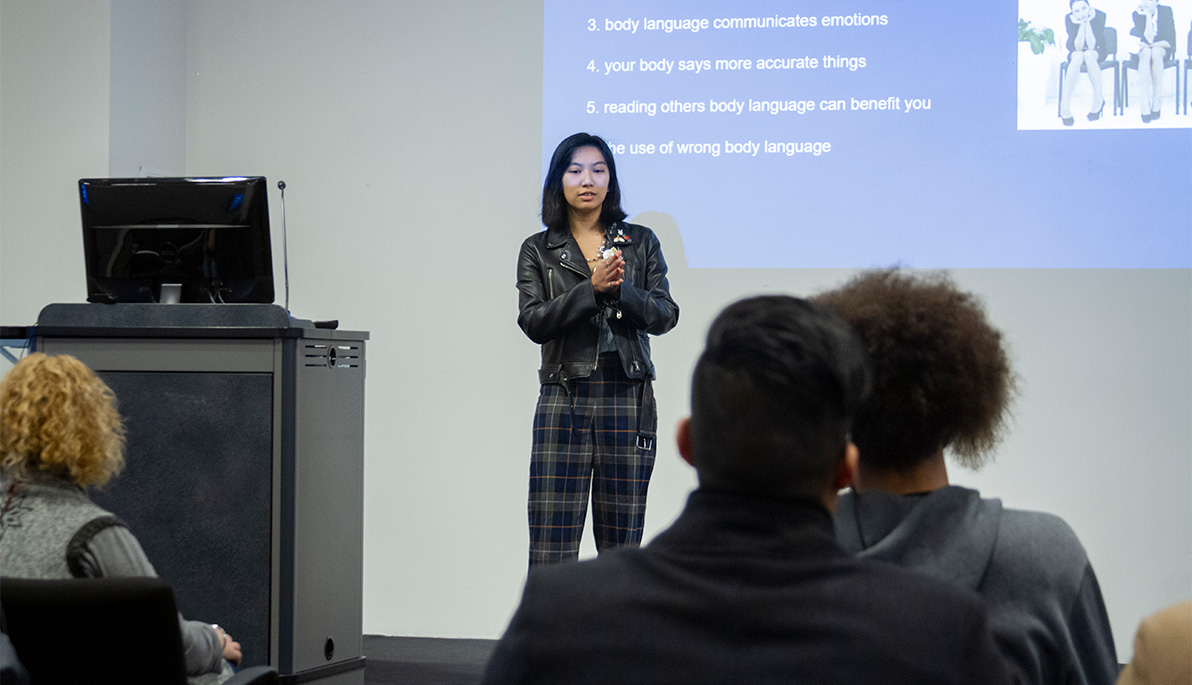
Connecting the Classroom With the Community
December 16, 2019
Pictured: Shwe Ye Shoon Myat, student-researcher for the project “Bodies Speak,” explains her group’s findings on body language in children.
Facing the unknown. Navigating uncomfortable situations. Finding common ground with strangers. These were some of the lessons celebrated at the student-run 2019 Service-Learning Conference on December 10 on the New York City campus.
Future researchers, educators, artists, engineers, architects, and professionals in careers yet to be invented, shared community-based service-learning projects in support of science, technology, engineering, art, and math (STEAM). In service-learning, the theory or concept of a course is paired with a social issue in the community. Students learn key concepts and then apply the lessons to solve a problem for the public good. The critical thinking gained from performing these community-based projects can also build valuable soft skills that employers are looking for, including confidence and interpersonal skills.
“The benefit for students who engage in service-learning is that it gives them a much larger, well-rounded picture of the world and its complexities,” said Amy Bravo, M.A., senior director of the Office of International and Experiential Education. “Students who actually get out and immerse themselves in the complexities of the world and seek solutions, those are the students who can benefit after graduation because they take that critical thinking with them in every role.”
Critical thinking and real-world immersion were key themes throughout the day’s event. Students overcame challenges in a variety of STEAM-based projects that took them into New York City public schools, where one group taught music theory and another analyzed children’s body language, as well as beyond the classroom to study problems such as Long Island’s food waste and transit sustainability. Jim Martinez, Ph.D., associate professor and chair of Interdisciplinary Studies, emphasized the ways that service-learning activities, such as teaching children to paint with the elderly, push students past their comfort zones and help them to realize their full potential.
“What you learn in service-learning is to become aware that things aren’t perfect but that you still have to proceed,” he said. “You learn that you can engage in challenging situations, even though you haven’t completed your undergraduate degree. This is something you can participate in, changing things, engaging in challenging situations, given who you [already] are, and that’s the value.”
Computer science student Larosh Shaikh explained how his father, who emigrated from Pakistan to the United States and worked tirelessly to earn a Ph.D. from an Ivy League university, taught Shaikh the importance of “showing up,” a lesson that he aimed to pass on to the community he served.
He noted that he doesn’t look at service-learning as an obligation or feel that he has to volunteer because his professor told him to, but because he is genuinely interested in giving back what people have taught him. This is especially true for the lesson that his father gave him, “that you can change the outcome of your life with education.”
The annual conference was held in partnership with the College of Arts and Sciences and Office of International and Experiential Education. During the fall semester, 353 students completed more than 170 hours of service-learning on projects that had a $4,361 economic impact.
More Features

An Alumnus’ Commitment to the Environment
As an energy management graduate from New York Tech’s Vancouver campus, Jasdeep Gulati (M.S. ’22) is highly invested in educating people about environmental and climate sustainability.

Vancouver Faculty Win University-Sponsored Research Awards in New Program
The new Global Impact Research Grant (GIRG) program has been developed to keep Vancouver-based faculty connected to faculty and research projects being conducted on the university’s New York campuses.

Studying Climate Change One Degree at a Time
Junhua Qu (M.S. ’24) began her collegiate journey in Beijing. But, her interest in climate change took her to New York Tech’s Vancouver campus to study energy management.
